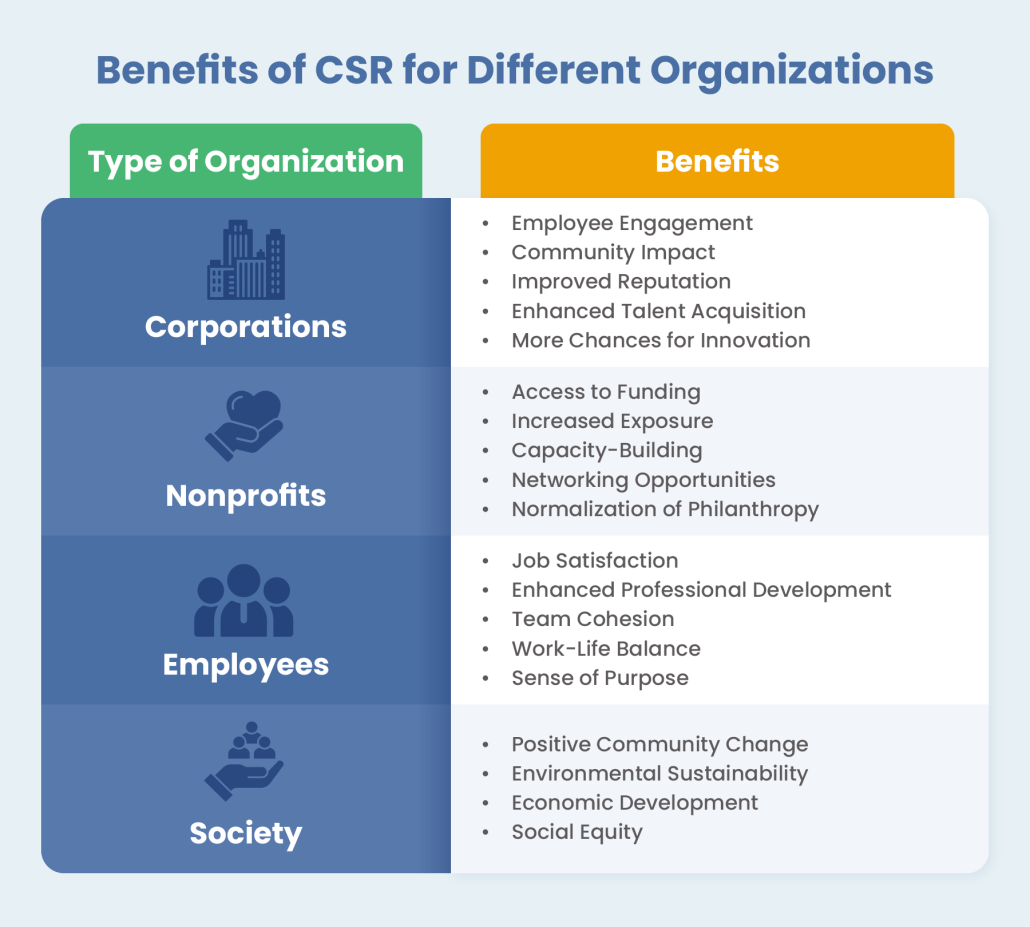Harnessing the Power of CSR Initiatives: Strategies for Nonprofits to Build Sustainable Partnerships

For nonprofits, establishing and maintaining robust partnerships with corporations through corporate social responsibility (CSR) initiatives can significantly bolster sustainable fundraising efforts and enhance impact. This guide explores actionable strategies for nonprofits to engage effectively with CSR initiatives, build sustainable partnerships, and leverage these alliances for long-term benefits.
Businesses increasingly recognize the importance of CSR initiatives, seeking to contribute positively to society while aligning with their strategic objectives. For nonprofits, understanding how to tap into these resources can be transformative.
1. Understand the CSR Landscape
The first step for any nonprofit is to understand the CSR landscape. Recognize that CSR initiatives vary widely in scope and nature, depending on the company’s values, industry, and business goals. Some corporations may focus on environmental sustainability, others on education, healthcare, or community development. Identifying these focus areas is crucial to ensuring alignment with your nonprofit’s mission.
- Research potential corporate partners: Use tools and platforms that provide detailed profiles of companies’ CSR activities, such as DaanVeda, which simplifies the process by offering comprehensive insights and alignment tools.
- Stay updated on trends: Keep abreast of evolving CSR trends. Companies regularly update their CSR strategies in response to societal needs and stakeholder expectations. Nonprofits should be agile in adapting to these trends.
2. Build a Compelling Value Proposition
Corporations are inundated with partnership requests from numerous nonprofits. To stand out, articulate a clear, concise, and compelling value proposition.
- Highlight mutual benefits: Present your case by demonstrating what the partnership can offer the corporation. This might include brand enhancement, employee engagement opportunities, or alignment with their CSR goals.
- Showcase impact: Use data and success stories to illustrate the tangible outcomes your nonprofit has achieved. Concrete evidence of your impact can significantly influence corporate decision-makers.
- Align missions: Clearly connect your nonprofit’s mission with the company’s CSR goals. Show how the partnership can help achieve shared objectives.
3. Foster Relationships with Key Stakeholders
Building sustainable partnerships requires cultivating strong relationships with key stakeholders within the corporation. This involves engaging with CSR heads, donor engagement officers, and other decision-makers.
- Personal connections: Attend industry events, CSR forums, and networking opportunities to meet potential partners in person.
- Regular communication: Maintain regular contact with existing and potential partners. Share updates on your projects, invite them to events, and continuously demonstrate the value of your partnership.
- Leverage existing relationships: If you have board members, volunteers, or donors with corporate connections, enlist their help in making introductions.
4. Utilize Digital Tools and Platforms
Technology has revolutionized how nonprofits connect with corporate partners. Leveraging digital tools can streamline the process of identifying, engaging, and managing partnerships.
- Utilize CSR platforms: Platforms like DaanVeda offer detailed profiles, alignment tools, and engagement opportunities, making it easier to find and connect with companies whose CSR initiatives align with your nonprofit’s mission.
- Optimize your online presence: Ensure your website and social media profiles effectively communicate your mission, values, and impact. Corporate partners often conduct online research before committing to partnerships.
- Track interactions: Use customer relationship management (CRM) systems to track your interactions with corporate partners, manage follow-ups, and maintain a professional approach.
5. Develop Long-Term Engagement Plans
Short-term donations can be beneficial, but long-term partnerships provide sustainability and predictability in funding. Develop engagement plans that foster long-term relationships.
- Create partnership tiers: Offer different levels of engagement for corporate partners, such as sponsorships, collaborative projects, or cause-related marketing campaigns.
- Engage employees: Encourage corporate partners to involve their employees through volunteer programs, matching gift programs, or fundraising initiatives.
- Regular reporting: Provide regular updates on the impact of their contributions. Transparency strengthens trust and fosters a sense of partnership.
6. Highlight Successful Case Studies
Demonstrating successful partnerships can be a powerful tool in gaining new corporate allies. Highlighting previous success stories shows potential partners the tangible benefits of working with your nonprofit.
- Build a portfolio: Create a portfolio of case studies showcasing past and current partnerships. Include specific outcomes, testimonials, and media coverage.
- Use multimedia: Utilize videos, infographics, and detailed reports to make your case studies engaging and easy to share.
- Share on multiple platforms: Promote your case studies through your website, social media, and during meetings or presentations with potential partners.
7. Emphasize the Long-Term Benefits
When pitching to potential corporate partners, it’s crucial to emphasize the long-term benefits of a sustained partnership.
- Brand enhancement: Detail how the company’s association with your mission can enhance its brand image and reputation within the community and among customers.
- Employee satisfaction: Highlight how CSR initiatives can positively impact employee morale, retention, and recruitment by providing opportunities for meaningful engagement.
- Market differentiation: Explain how a partnership with your nonprofit can differentiate the company from its competitors by showcasing its commitment to social responsibility.
In conclusion, harnessing the power of CSR initiatives to build sustainable partnerships requires strategic planning, a clear value proposition, strong relationships, and effective use of digital tools. Nonprofits need to invest time and effort into understanding the CSR landscape, compellingly articulating their impact, and developing long-term engagement strategies. Platforms like DaanVeda can be invaluable resources in this journey, providing the necessary tools to identify and connect with potential corporate partners, ultimately fostering meaningful, lasting collaborations that drive societal change.
